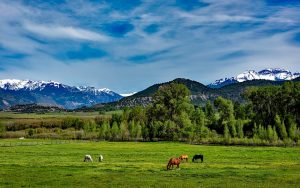
Question: If I am going to be taking my horses on a long (30-50) mile pack trip this summer, what special precautions and preparations should I make for them?
Here in Colorado, we are privileged to have millions of acres of National Forest, BLM, open space and Wilderness areas, and miles upon miles of trails that we can explore with our horses. Horses allow us to delve deeper into the woods, and escape the routine of our normal lives in the company of our equine companions. If you are taking your horses into the backcountry, there are a number of important points to think about to ensure you all have the safest, and most enjoyable trip possible.
Conditioning your horse for the rigorous, physical work of long days and a lot of miles is a very important factor in minimizing the chance of medical issues when you are a fair distance from help. Properly conditioning your horse takes preparation, just as it does for your own body. Conditioning should start easy, at a “working pace” for an hour or so to begin with. As your horse becomes used to this routine, progress into longer and harder workouts until after a couple months your horse should be able to work for 3-4 hours without much issue. A little tip: as you are conditioning your horses, pay attention to which horse likes to lead and which horse likes to follow. If you are packing, this will make your life much easier.
Tack is also a key consideration when entering the back country. Be sure that all tack, riding saddles, pack saddles, and bridles fit appropriately. On longer rides, any small problem becomes a big one, and proper fit will minimize the chance of cinch sores or saddle sores, which can ruin an otherwise wonderful trip! I like to ride with a breast collar and a rear cinch to minimize the shift of the saddle while climbing up and down hills.
From a veterinary standpoint, there are certainly some fairly common issues that arise on the trail. The most common are lacerations, cuts or abrasions. Having a small bandage kit and antiseptic should cover most of these, and certainly enable you to get to help for treatment of more significant lacerations. A good bandage kit should include betadine, sterile pads, gauze, cotton wrap, vetwrap and elasticon. If you are not comfortable with bandaging your horse, any of us here at Mobile Vet will be happy to show you how. For more in-depth information on what should be in a good trail first aid kit, see our blog post “Trail First Aid. What Do I Need?”
The other common issue that you might run into is colic. Have a discussion with your veterinarian about appropriate medicine, and how to use that medicine, before you hit the trail. This is paramount to getting a sick horse dealt with in a timely manner. Prevention is the best medicine for treating colics in the backcountry. If you can, a week or so before leaving, begin to transition your horses’ diet to the diet they will be eating on the trip. Horses thrive on consistency. So, whenever making changes for any reason, try to transition is over a longer period of time to get your horse used to the new feed or routine.
With proper conditioning, a bit of training, good tack and a bit of preparation, you can truly enjoy the back country with your horses. So get out there and have an adventure!








No comment yet, add your voice below!